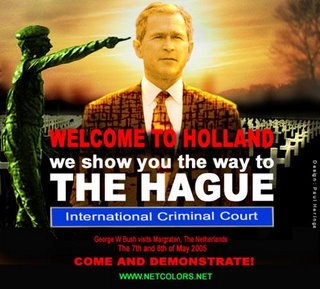
The Hague Invasion Act
******************************
-The US and The Netherlands: Allies For Life?-
Courtesy Of: The Baltimore Chronicle
By Frans Van Rumpt
May 15, 2006
Last month I saw a member of the Dutch Conservative VVD Party on television speaking on US-Dutch relations. Traditionally this party has always been very pro-American. They were supportive of US foreign policy and took a friendly attitude towards the US.
But something was wrong with the VVD politician I saw on television. He wasn't using the normal rhetoric about how the Americans and the Dutch are close buddies, allies for life, always there for each other and always ready to help each other.
In fact he was critical, very critical, of US foreign policy. How was this possible? What made this change happen?
I believe it wasn't a sudden change. Over the past few years Washington decided to approach foreign policy unilaterally--Not working with other countries, but pressuring them, and sometimes even threatening them into cooperating with the US.
Current US foreign policy, in the eyes of the most Europeans, is aggressive--and many believe it is downright unjustified. Many Europeans believe that locking people up like the US at Guantanamo Bay, for instance, without due process of law, is Just not right.
Furthermore, there is a mistrust of the American government due to the persistent rumors of the use of torture in countries in Eastern Europe and East Africa.
As for the Dutch, they have their own reasons to be suspicious of American intentions. In August 2002 Congress passed the "American Servicemembers Protection Act." Many people however, soon called this act "The Hague Invasion Act."
The Hague is an important city in the western region of the Netherlands and is often associated with peace. In 1899 the First Peace Conference at the Hague was held, which led to the forming of the International Court of Arbitage. Soon after, the rich American Steel Magnate Andrew Carnegie donated money to build the famous Palace of Peace (built between 1907-1913).
The International Criminal Court (ICC) is currently located in the Palace of Peace. It is precisely this court that frustrated the US government, and they decided to take action with this legislation.
The Hague Invasion Act is simple; for example, if the ICC even holds an American prisoner in the Hague, the US has the 'legal' option to attack th Netherlands and invade the Hague, in order to free this prisoner.
Threatening to attack the Palace of Peace doesn't look good anywhere, but threatening to attack a longtime NATO ally and friend is insane, at least in the opinion of most Dutch people.
I remember several hundred people Joined a protest at the beach in the Hague in August 2002. They were filling sandbags, digging trenches and watching the sea for American ships.
In January 2006 the relationship between the US and the Netherlands reached a new low when the US made it clear to the Netherlands that they have to Join a new mission in Afghanistan. The Netherlands already committed troops and money to Afghanistan and Dutch troops served in Iraq as well, but that does not appear to be enough for the US.
The question at hand is whether or not to deploy at least 1200 more soldiers in a relatively dangerous part of Afghanistan for at least another two years.
A lot of Dutch people are against this and that goes for several cabinet members as well. Only the prime minister and some ministers close to him are really in favor of this mission.
It seemed so simple: With many people opposing a new mission, we do not expect it to happen.
But January 2006 proved why Afghanistan is still an issue. Paul Bremer III, former ambassador to the Netherlands and head of the Coalition Provisional Authority (CPA) in Iraq for a while, broke the news to the Dutch.
It was in the papers and on the news January 9: "If you don't cooperate with the US and do not send those troops as we Americans wish, you will face some form of economic sanctions."
I met Paul Bremer once in Amsterdam during a conference on terrorism some years before 9/11. We talked for a while, and I asked him some questions about terrorism, but the conversation must not have been that interesting because I can't recall exactly what we talked about.
However, I am sure what I would like to ask him now if we were to meet again. I would ask him, what happened to the good relationship the Netherlands always had with the United States of America. Relations between our nations were always friendly and based on mutual respect.
Now I hesitate to use the word "friendly" to describe our relationship. It can hardly be called "friendly" to be threatened with invasion or be blackmailed into submission.
"With allies like the US you don't need enemies," is what people are saying in Europe and the Netherlands.
My second question to Bremer would be: Are these people right?
Source:
http://baltimorechronicle.com/2006/051506Rumpt.shtml
1) Human Rights Watch: U.S. 'Hague Invasion Act' Becomes Law.
White House "stops at nothing" in Campaign Against War Crimes Court.
(New York, August 3, 2002):
http://hrw.org/press/2002/08/aspa080302.htm
2) American Servicemembers Protection Act
(The Hague Invasion Act)
Complete Text of Lesgislation:
http://www.jura.uni-muenchen.de/einrichtungen/ls/simma/Dokumente%20Andreas/ASPA.htm




No comments:
Post a Comment